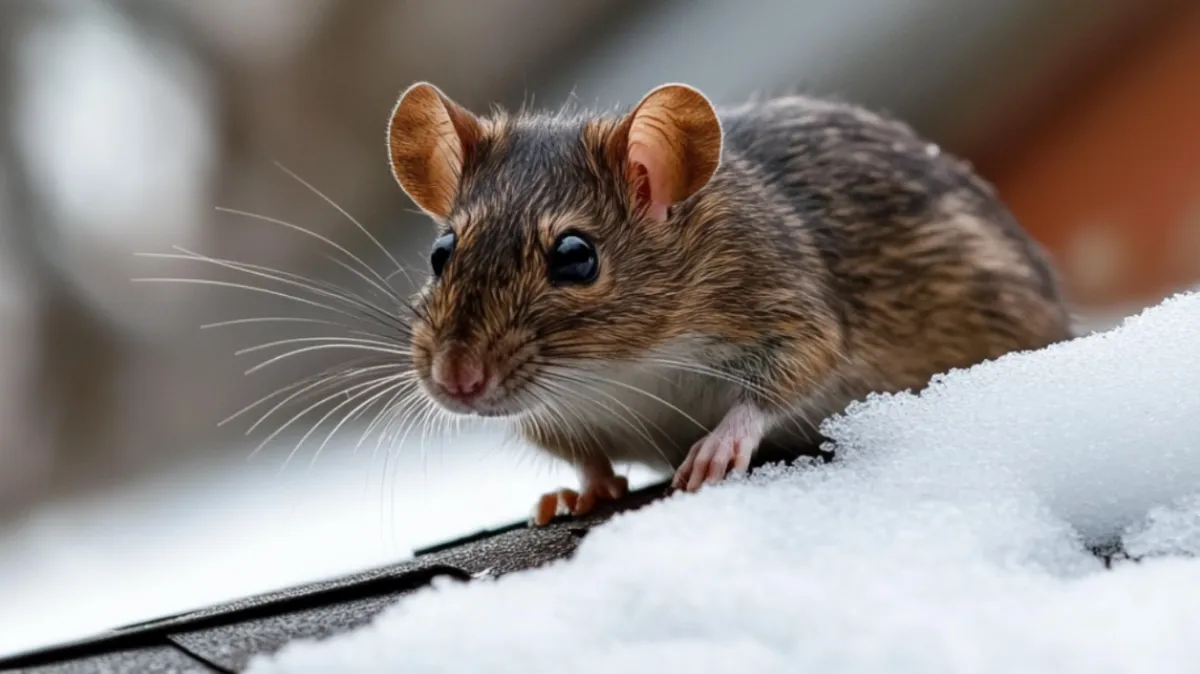Designed to Educate, Motivate & Inspire
The Guardian Journal
Welcome to the Guardian Pest & Termite journal section, your go-to resource for expert insights and tips on pest control solutions. Whether you're dealing with stubborn termites, bothersome rodents, or persistent bed bugs, our journal offers practical advice, preventive measures, and the latest industry updates. Stay informed with our comprehensive guides and learn how to protect your home or business effectively. To learn more contact us, we are here to help you maintain a pest-free environment year-round.

Wintertime Pests in the Fort Mill: Staying Vigilant Against Cold-Weather Intruders
Understanding Cold-Weather Pests
Here’s a closer look at some common cold-weather pests and why managing them effectively is crucial.
Rodents: Mice and rats are among the most worrisome pests during the winter months. These creatures are attracted to the warmth and availability of food in your home and can squeeze through gaps as small as a dime. Once inside, rodents can cause significant damage by gnawing on electrical wires, insulation, and wooden structures, potentially leading to electrical fires and costly repairs. They are also known carriers of diseases such as hantavirus and salmonella, which pose serious health risks. Conducting thorough home inspections to identify and seal up any potential entry points is an essential step in preventing an infestation.
Cockroaches: Known for their resilience, cockroaches seek out warm, moist environments to survive the winter. Kitchens, bathrooms, and laundry areas provide ideal conditions for these pests due to the availability of water and potential food sources. Cockroaches can contaminate food, utensils, and cooking surfaces as they forage, spreading bacteria and pathogens that can lead to food poisoning and allergies. Regular cleaning, proper food storage, and moisture control are key strategies to keep these pests at bay.
Spiders: While spiders commonly enter homes during the fall when they start seeking shelter from the decreasing temperatures, they become more settled during the winter months. They typically hide in dark, secluded areas such as basements, attics, and other rarely disturbed parts of the home. While most house spiders pose little danger to humans, their presence can be unsettling and contribute to cobwebs that detract from your home's cleanliness. Keeping areas clear of clutter, sealing cracks around windows and doors, and regular dusting can help minimize spider populations indoors.
Why a Year-Round Pest Management Strategy is Essential
Here’s a deeper look at why a year-round pest management strategy isn't just beneficial but necessary:
Seasonal Adaptability: Pests exhibit remarkable adaptability to changing environments, particularly with the distinct seasons experienced in the Fort Mill. In spring, the surge in warmth and moisture awakens dormant pests; summer heat accelerates breeding and activity levels; fall brings pests indoors seeking shelter from cooling temperatures; and winter sees them hunkering down within your home to escape the cold. Each season ushers in different pest challenges, from ants and mosquitoes to rodents and spiders, making year-round vigilance crucial.
Continuous Protection: Just as pests adapt, so must our strategies to control them. Pests are persistent and can breed rapidly, meaning that without consistent monitoring and intervention, a small problem can quickly become an infestation. Regular inspections identify potential issues early, while ongoing treatments maintain a barrier that prevents new pests from establishing a foothold. This continuous cycle of assessment and response ensures that pests do not have the opportunity to settle, ensuring your home stays pest-free.
Healthier Living Environment: Many common pests, such as mosquitoes, ticks, rodents, and cockroaches, are vectors for disease, carrying pathogens that can lead to health issues like Lyme disease, West Nile virus, salmonellosis, and more. Moreover, pest droppings, shed skins, and other detritus can exacerbate allergies and asthma, particularly in children and sensitive individuals. Continuous pest management helps to control these pest populations, thereby reducing the risk of disease and allergic reactions. This proactive approach ensures a healthier, safer environment for you and your family throughout the year.
Economic Savings: Frequent pest issues can lead to costly repairs and medical bills. By maintaining a year-round pest management strategy, you can avoid the high costs associated with major infestations and the damage they cause. Preventative measures and early detection are typically less expensive than the extensive remedies needed once pests have become firmly established.
DIY Prevention Tips: Simple Steps to Keep Pests at Bay Between Professional Treatments
Keeping your home pest-free isn't just about having a professional pest control service; it's also about taking proactive measures in your daily routine. Here are some practical DIY tips that can significantly reduce the likelihood of pest infestations and complement the professional treatments you receive from Fort Mill Exterminators:
Natural Deterrents:
Essential Oils: Certain oils like peppermint, tea tree, and lavender are known for their pest-repellent properties. A few drops in water used as a spray can help keep insects away.
Herbs and Spices: Planting herbs like basil, mint, and rosemary near entry points can naturally deter pests. Additionally, spices such as cinnamon and cloves can be sprinkled in areas where pests are frequent.
Proper Food Storage:
Seal and Store: Store pantry items such as cereals, flours, and baking ingredients in airtight containers. This not only keeps food fresh but also prevents pests like ants, beetles, and mice from being attracted to your food supply.
Regular Cleaning: Clean up crumbs and spills immediately, especially in dining and kitchen areas. Regularly wiping down surfaces can deter pests from scavenging for food remnants.
Clutter Reduction:
Declutter Spaces: Pests love hiding in cluttered, undisturbed areas. Regularly organizing your home and minimizing unnecessary clutter can reduce hiding spots for pests like spiders and roaches.
Storage Solutions: Store seasonal items and rarely used objects in plastic, sealed bins rather than cardboard boxes which can attract pests.
Home Maintenance Checks:
Seal Gaps: Check for gaps around doors and windows and seal them with weather stripping or caulk. This prevents pests like mice and insects from sneaking into your home.
Drain Maintenance: Ensure that all drains are clear and functioning properly. Standing water can attract pests such as mosquitoes, so fixing any leaky faucets or plumbing issues is crucial.
Yard Upkeep:
Trim Vegetation: Keep bushes and trees trimmed back from the house. This eliminates bridges that pests might use to enter your home.
Remove Debris: Regularly clean up yard debris such as leaf piles and stacked wood, which can provide ideal nesting sites for pests.
For more details on our winter services or to schedule an inspection, visit our website or contact us directly. Stay vigilant and proactive with Fort Mill Exterminators, and make this new year a pest-free one!
Indian Land, SC Pest Control Journal
Copyright 2024. All Right Reserved.

